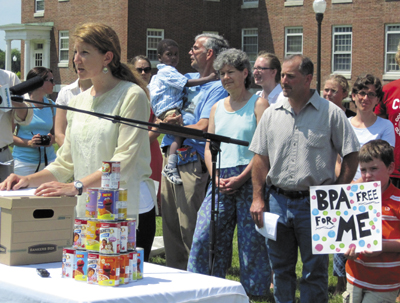AUGUSTA — More than a dozen mothers turned in signatures today to try to compel the state Board of Environmental Protection to ban the chemical bisphenol-A from baby and toddler food packaging.
“No child should be exposed to the hormone havoc of BPA at the dinner table,” said Annie Colaluca, a mother of three from Waterville.
BPA is a common chemical additive used in some hardened plastics. Maine has already banned it from baby bottles, sippy cups and other reusable food and beverage containers. The groups are hoping the state will now extend that ban to cans and jars that hold baby and toddler foods.
The Environmental Health Strategy Center and Natural Resources Council of Maine organized the effort to gather more than 800 signatures as part of a citizen petition process. The state requires at least 150 valid signatures be turned in before it will begin consideration of a new state rule.
Department of Environmental Protection Commissioner Pattie Aho accepted the petitions and said the board will now begin the process of considering the rule. That will include a public hearing at a later date.
Gov. Paul LePage made headlines last year when he said the “worst case is some women may have little beards” from being exposed to the chemical. Today, his spokeswoman Adrienne Bennett, said the administration still does not believe there’s ample scientific evidence to support a ban.
“As the Obama administration indicated in March, there remain serious questions about BPA studies as they relate to humans and the public health impact of BPA,” she said. “The governor supports scientific evidence which is conclusive; however, there is not yet a consensus among scientists about BPA. Additionally, we are uncertain about the safety of BPA alternatives. It is dangerous to let so many unknowns drive public policy.”
Bennett was referring to a March FDA statement in response to a petition to ban the substance that said while studies have raised questions about the safety of BPA, “there remain serious questions about these studies, particularly as they relate to humans.”
At the press conference outside DEP offices in Augusta today, Michael Beliveau, president of the Environmental Health Strategy Center, said there are several safe BPA-free alternatives available now.
“The market has just begun to move away from BPA, so it’s a perfect time for public policy action to force the laggards to move and to ensure the safety of all alternatives,” he said.
Send questions/comments to the editors.


